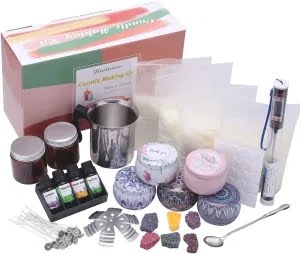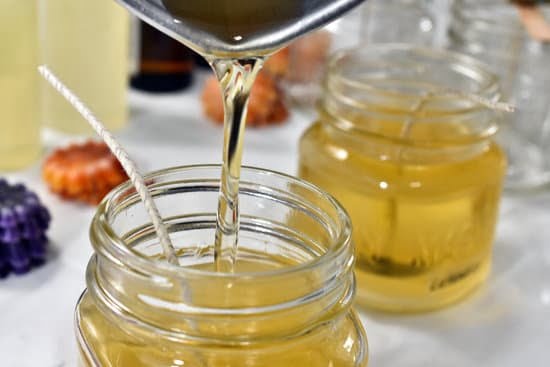Are you looking to create beautifully scented candles at home? The best oils for candle making are essential in achieving the perfect aroma and quality. The type of oil used plays a crucial role in determining the fragrance, burn time, and overall performance of the candle. In this article, we will explore the different types of oils available for candle making and provide valuable insights into selecting the best oils to enhance your candle-making experience.
When it comes to creating handcrafted candles, the choice of oils is essential for achieving desired scents and ensuring a high-quality end product. Different types of oils such as essential oils, fragrance oils, and natural oils offer distinct benefits and contribute to the overall appeal of the candles. Understanding these various oil options is crucial in creating unique, personalized candles that cater to individual preferences.
In this comprehensive guide, we will delve into the top essential oils for candle making and their unique scents and benefits. Additionally, we will highlight the best fragrance oils known for their strong and long-lasting scents commonly used in candle making.
Furthermore, we will explore natural oils such as soybean oil, coconut oil, and palm oil that offer sustainable and eco-friendly options while enhancing the quality of homemade candles. Whether you are an experienced candle maker or just starting out, learning about these different types of oils is essential for creating beautifully fragrant candles that stand out.
Different Types of Candle Oils
When it comes to making high-quality candles, choosing the best oils is essential. Essential oils are a popular choice for candle making due to their natural scents and therapeutic properties. Some of the top essential oils for candle making include lavender, eucalyptus, and lemon.
Lavender essential oil is known for its calming and soothing properties, making it a great choice for relaxation candles. Eucalyptus essential oil has a refreshing and invigorating scent, perfect for creating candles that promote a sense of clarity and revitalization. Lemon essential oil offers a bright and citrusy aroma that can uplift moods and create an energizing atmosphere in any space.
These essential oils not only provide delightful scents but also offer potential health benefits through aromatherapy. When blended with soy or palm oil, these essential oils can create beautifully scented candles that promote wellness and relaxation. Ultimately, the right combination of essential oils can elevate the overall quality of your homemade candles.
| Essential Oil | Unique Scent/Benefits |
|---|---|
| Lavender | Calming and soothing properties |
| Eucalyptus | Refreshing and invigorating scent |
| Lemon | Bright and citrusy aroma |
Top Essential Oils for Candle Making
When it comes to candle making, the choice of oils plays a crucial role in determining the quality and fragrance of the final product. Essential oils are highly valued for their natural scents and therapeutic properties, making them a popular choice for candle makers. Here are some of the best essential oils for candle making:
1. Lavender Oil: Known for its calming and relaxing properties, lavender oil is a favorite among candle makers. Its floral and herbaceous aroma lends a soothing and fresh scent to candles, perfect for creating a peaceful ambiance in any space.
2. Peppermint Oil: With its invigorating and uplifting scent, peppermint oil is often used to create energizing candles. The cool and refreshing aroma not only adds a pleasant fragrance to the candles but also helps in promoting alertness and focus.
3. Lemon Oil: Renowned for its citrusy and uplifting fragrance, lemon oil is an excellent choice for creating refreshing and rejuvenating candles. Its clean and zesty scent can help eliminate odors, making it ideal for use in kitchens or bathrooms.
4. Eucalyptus Oil: Due to its fresh and minty aroma, eucalyptus oil is commonly used in candle making to promote respiratory health and clear breathing. The invigorating scent adds a refreshing touch to candles, perfect for creating a spa-like atmosphere at home.
By carefully selecting the best essential oils for candle making, crafters can create unique and aromatic candles that cater to different preferences and purposes, from relaxation to energizing effects.
Best Fragrance Oils for Candle Making
When it comes to candle making, fragrance oils play a significant role in creating candles with strong and long-lasting scents. The best fragrance oils for candle making are essential for ensuring that the candles fill the room with captivating aromas. Whether you prefer floral, fruity, or earthy scents, there are various fragrance oils to choose from to enhance your candle-making experience.
Some of the top fragrance oils for candle making include:
- Vanilla: Known for its warm and comforting scent, vanilla fragrance oil is a popular choice for candle makers.
- Lavender: With its calming and soothing properties, lavender fragrance oil is perfect for creating relaxing candles.
- Sandalwood: This woody and exotic fragrance oil adds a touch of sophistication to candles.
- Citrus: Whether it’s lemon, orange, or grapefruit, citrus fragrance oils bring a refreshing and invigorating scent to candles.
These fragrance oils are commonly used for their ability to disperse well in wax and produce strong scents that last throughout the burning process. When choosing fragrance oils for your candle making endeavors, consider the type of atmosphere you want to create with your candles and select scents that align with your preferences.
It’s important to note that not all fragrance oils are created equal. When purchasing fragrance oils for candle making, be sure to choose high-quality options from reputable suppliers. Investing in premium fragrance oils will ensure that your candles have exceptional scent throw and longevity. By selecting the best fragrance oils for your candle making projects, you can elevate the sensory experience for yourself and those who enjoy your beautifully fragranced creations.
Natural Oils for Candle Making
When it comes to candle making, natural oils are a popular choice due to their numerous benefits. Not only do they offer unique scents, but they also provide eco-friendly and sustainable options for creating high-quality candles. Some of the best oils for candle making include soybean oil, coconut oil, and palm oil.
Soybean oil is a favorite among candle makers due to its clean-burning properties and excellent scent throw. It is known for producing candles with a longer burn time and minimal soot, making it an ideal choice for those who prioritize sustainability and eco-friendliness in their candle-making process.
Coconut oil is another natural oil that is highly regarded in the candle-making community. It has a low melting point, which makes it easy to work with when creating candles. Additionally, coconut oil offers a subtle tropical scent that can add a relaxing and soothing ambiance to any space.
Palm oil is often used in combination with other natural oils to create candles with a smooth and creamy texture. It’s known for enhancing the fragrance of the candles while also providing a long-lasting burn. When used responsibly and sustainably sourced, palm oil can be a great option for environmentally conscious candle makers.
Natural oils not only contribute to the overall quality of the candles but also align with the increasing demand for sustainable and eco-friendly products in today’s market. By understanding the benefits of using natural oils such as soybean oil, coconut oil, and palm oil in candle making, crafters can create unique, high-quality candles that cater to the growing preference for environmentally friendly products.
| Natural Oil | Benefits |
|---|---|
| Soybean Oil | Clean-burning properties, longer burn time, minimal soot |
| Coconut Oil | Low melting point, subtle tropical scent |
| Palm Oil | Creamy texture, enhances fragrance, long-lasting burn |
Tips for Choosing the Right Oils
When it comes to making candles, the type of oil used plays a crucial role in determining the overall quality of the end product. Choosing the best oils for candle making is essential for achieving the desired scent, burn time, and overall quality of the candles.
With a wide variety of oils available, it can be overwhelming to decide which ones are best suited for your specific needs. Here are some valuable tips on how to select the best oils for candle making based on your desired scent, burn time, and quality of the candles.
Determine Your Desired Scent
The first step in choosing the right oils for candle making is to determine the desired scent you want to achieve. Essential oils are popular choices for those who prefer natural and therapeutic scents such as lavender, eucalyptus, or citrus.
On the other hand, fragrance oils offer a wide range of synthetic scents that can mimic anything from fresh linen to baked goods. Understanding your preferred scent profile will help narrow down the options and make it easier to choose the best oils for your candles.
Consider Burn Time
Another important factor to consider when selecting oils for candle making is the burn time. Some oils, such as soybean oil and coconut oil, have a longer burn time compared to others. If you want your candles to last longer, choosing oils with longer burn times will be beneficial. However, keep in mind that certain oils may also impact the consistency and texture of the wax, so it’s essential to strike a balance between burn time and overall quality.
Focus on Quality
Lastly, when choosing oils for candle making, it’s crucial to prioritize quality. High-quality oils not only contribute to better scent throw and burn time but also ensure that your candles are safe and free from harmful additives or impurities.
Look for reputable suppliers that offer pure and natural oils without any fillers or artificial ingredients. Investing in high-quality oils may require a slightly higher budget but will ultimately result in superior candles that meet both aesthetic and functional expectations.
By considering these tips when selecting the best oils for candle making, you can create high-quality candles with long-lasting scents that cater to your preferences.
Mixing and Blending Oils
When it comes to candle making, one of the most exciting aspects is the ability to blend different oils to create custom scents that cater to individual preferences. By carefully mixing and blending various types of essential oils, fragrance oils, and natural oils, candle makers can elevate the overall fragrance of their candles and offer unique scent combinations that set their products apart from others on the market.
Understanding Scent Profiles
Before diving into the art of oil blending for candle making, it’s important to have a basic understanding of scent profiles. Different oils carry distinct aromatic properties, with some being more floral, citrusy, earthy, or musky. By familiarizing oneself with the various scent profiles of different oils, candle makers can better envision how these scents might complement or contrast with each other in a blend.
Creating Custom Blends
One approach to blending oils for candle making is to create custom blends that consist of two or more different oils carefully selected for their individual scents and properties. For example, combining lavender essential oil with eucalyptus essential oil can produce a refreshing yet soothing aroma that’s perfect for relaxation and stress relief. Similarly, blending vanilla fragrance oil with cinnamon fragrance oil can result in a warm and inviting scent reminiscent of baked goods.
Layering Scents
Another technique for blending oils in candle making involves layering scents to achieve complexity and depth in fragrance. This approach entails adding multiple layers of different scented oils at various stages during the candle-making process. By layering complementary scents such as floral and woody or sweet and spicy, candle makers can create multi-dimensional fragrances that evolve as the candle burns, providing an enriching olfactory experience for users.
By mastering the art of mixing and blending oils for candle making, artisans can truly unleash their creativity and craft unique candles with captivating aromas that delight the senses. Experimentation is key when it comes to discovering new scent combinations, so don’t be afraid to explore different oil blends until you find the perfect balance that enhances the overall fragrance of your candles.
Conclusion
In conclusion, choosing the best oils for candle making is crucial to achieving the highest quality of candles. Whether you opt for essential oils, fragrance oils, or natural oils, each type plays a significant role in determining the scent, burn time, and overall appeal of your candles. By selecting high-quality oils, you can ensure that your candles are safe, fragrant, and long-lasting.
When it comes to the best oils for candle making, it’s important to consider not only the scents but also the potential benefits they offer. Essential oils like lavender, eucalyptus, and citrus not only provide delightful aromas but also contribute to a calming atmosphere or have mood-boosting properties. On the other hand, fragrance oils such as vanilla or sandalwood offer long-lasting scents that can fill a room with their enticing aromas.
Additionally, when mixing and blending different oils for candle making, it’s essential to experiment and find the right combination that produces a harmonious fragrance. By following these tips and considering all factors including scent preferences and burning time, you can create beautiful candles that emanate delightful aromas throughout any space. Ultimately, using high-quality oils is the key to achieving satisfying results in your candle making endeavors.
Frequently Asked Questions
What Are the Best Oils to Use for Candle Making?
The best oils to use for candle making are soy wax, coconut oil, and beeswax. These oils have low melting points and can hold a high concentration of fragrance, resulting in a strong scent throw when the candle is burned.
What Is the Best Carrier Oil for Candles?
The best carrier oil for candles is coconut oil. It has a low melting point and can hold a large amount of fragrance, making it an ideal choice for blending with essential oils to create scented candles.
What Are the Best Combinations of Essential Oils for Candles?
The best combinations of essential oils for candles depend on personal preference and the desired scent profile. Some popular combinations include lavender and vanilla for a calming scent, citrus and herbs for a fresh aroma, or patchouli and sandalwood for a earthy, grounding scent. Ultimately, the best combination will be based on individual taste preferences.

Welcome to my candle making blog! In this blog, I will be sharing my tips and tricks for making candles. I will also be sharing some of my favorite recipes.





